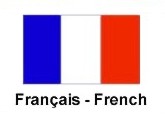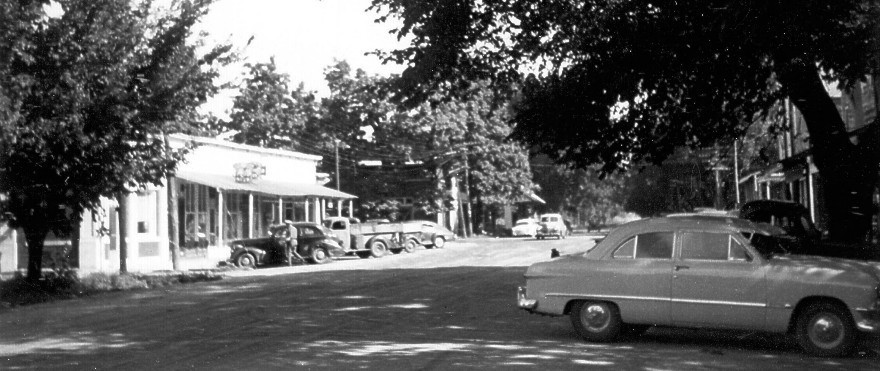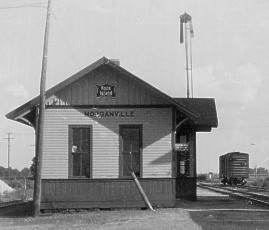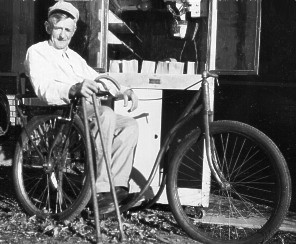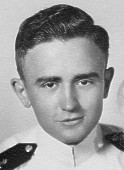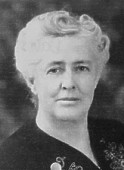The Performance
August 27 was a Friday. Late August days in Kansas are generally warm and this one was no exception. The thermometer reached 90 F by the late afternoon. A gentle dry breeze during the day made it feel a bit cooler.
If there was an official time when the pageant activities were to begin, it has been lost in the passage of years.
It most likely started at the end of the work day, so for many villagers, the morning and afternoon would be much
like any other. Trains would come and go at both the Rock Island and Union Pacific depots on the west side of
town.
Other than the preparations for the pageant, the village would most likely look the same as it did when McKee
arrived to interview the locals in 1950. He stayed in the Carson home about a block west of Main Street.
Southern side of the Rock Island railroad depot
I strolled a single block to town, noted the signs on the east side of Main Street: "Orville Young's Plumbing Shop," "Schooley Hardware," "Post Office," "Ruffner's Store," "Young's Cafe," "Nelson's Feed Store." On the west side: "Taddiken's Electric Shop," "West Side Café," "Pool Hall," "Oetinger's Store," "Leo Mellies' Filling Station," "Stadium."
The day outside of Morganville was remarkably unremarkable. The only notable news event was the death of former Supreme Court Chief Justice Charles Evans Hughes. This may have been a touch ironic as two of his most memorable quotes fit the day rather well: "A man has to live with himself, and he should see to it that he always has good company" and "War should be made a crime, and those who instigate it should be punished as criminals."
Despite the presence of a UNESCO and two professional photographers, as well as probably many private citizens with cameras, few
photographs have been found taken before the 8 p.m. start of the play. An exception may be the photo of Homer Christenson. McKee
wrote that before Christenson was crippled, he had played the trombone in the Ringling Brothers' Circus band. No foundation for
that statement has been found, but it is known he had previously been married and worked on a farm in the Dakotas.
But in 1948, he scraped out a living selling popcorn.
Homer Christenson and his popcorn stand
The light was starting to fade and the air was cooling by the play's beginning. The chicken dinners, games and horse rides for the
kids were done.
No program or complete script has been found, so only guesses can be made about what transpired. If Carson's "to-do"
notebook is used as a guide and it is assumed she wrote the important events in the order they occurred, it began
with 25-year-old Lyle Bloom, who had been in Patton's army at Metz, singing "The Star-Spangled Banner".
Dan and Lily Roenigk's son Ivan, a Navy Midshipman and choir member, was home on leave. He was studying French and
while it is not in Carson's notebook, we know he sang in French "La Marseillaise" - France's national anthem.
Local UNESCO chairman Jimmy Walter welcomed those present and read a telegram from French Ambassador
Henri Bonnet and a note from KSC's President Milton Eisenhower.
Ivan Roenigk
Morganville's Mayor Emette Davis then delivered his "mayor-to-mayor" speech.
With these formalities completed, the lights dimmed, a piano played softly and narrator Agnes (Davis) Anderson, sister of
Emette, began reading "Message to Fèves."
Narrator Agnes Anderson

